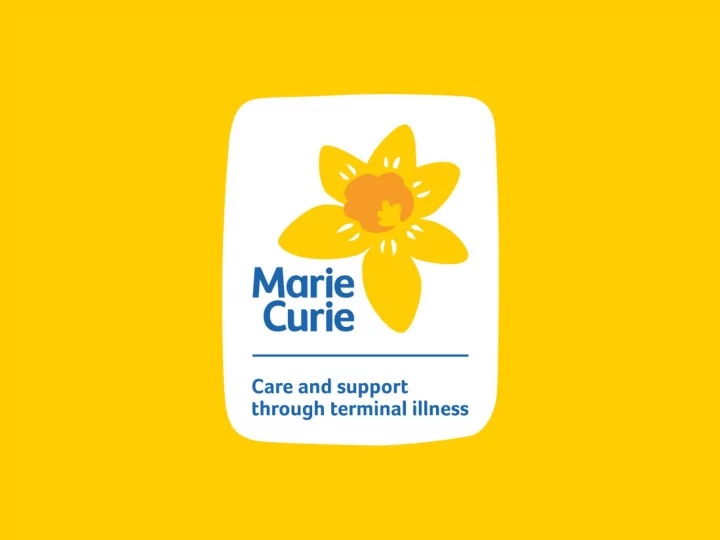

End of life care needs of people with dementia Presentation to Cross Party Group on Dementia Monica Reardon, 13 th June 2017
Death trajectories 3
Barriers to access • People with dementia don’t “fit” into the palliative care system • Healthcare professionals not recognising the need for palliative care • Barriers between health and social care • Lack of diagnosis and support • Access to and suitability of inpatient hospice care 4
Planning for death • Earlier discussions of the terminal nature of dementia and appropriate support to plan for this can allow people to have more control • Advanced care planning and advanced decisions will make the final stages of dementia better for everyone and improve the chances of a good death for the person with dementia • Barriers — knowledge of the Mental Capacity Act • Who discusses advanced care planning and when — what support do they need? 5
Carers • Access to respite “We don’t want them [our carers] to worry about how we are being treated, services we want them to know we are being • Patient concerns for treated well and that makes them feel better themselves and they don’t carers become ill over it.” • Bereavement support – partnerships with Cruse “It takes time to adjust. 24 hour living with somebody, caring for somebody to nothing…They’ve lost their friends, their hobbies, they need time to adjust and get back into the world.” 6
Assisted dying “I’d like to end my life when I • This theme has emerged choose, not be cared for until my in focus groups body says no. When my mind says enough, it’s enough.” • Recommendation for this to be explored further in terms of how prevalent it is as a barrier to “I think that I wouldn’t want my husband to get prosecuted for accessing care something I wanted, that would stop • Marie Curie’s ethical me from getting in touch [with Marie Curie] because I don’t want him or statement my daughter to. It’s my decision; it’s something that I want to do.” 7
References Marie Curie and the Alzheimer’s Society. 2015. Living and dying with dementia in Wales: barriers to care. Care Quality Commission. 2016. A different ending: Addressing inequalities in end of life care, overview report. Cruse Bereavement Care, Wales. https://www.cruse.org.uk/wales/dementia Marie Curie. Ethical statements, care and research. https://www.mariecurie.org.uk/who/plans-reports-policies/ethical-statements/care- research 8
Recommend
More recommend